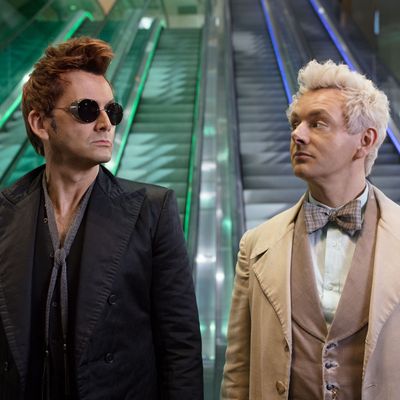
After the previous episode, Good Omens didn’t look like it had that far to go before arriving at the end of the world. Most of the story’s key players had been put in place — if only one of the Four Horsemen of the Apocalypse — Anathema had lost Agnes Nutter’s book, and Aziraphale had found it, ringing up the unassuming home of Adam, the actual Antichrist. How much further was there to go?
This third episode punts on answering that question, at least in its first half. Rather than immediately seeing the effects of Aziraphale’s phone call, it flashes back, all the way back, to 4004 B.C. and the Garden of Eden. There, in the moments immediately after the Fall, Aziraphale tells a white lie about what happened to his flaming sword, hopes for the best, and experiences no immediate consequences for his actions. Most of the episode’s first half, however, finds him less alone, if no less puzzled by the moral vagaries seemingly built into God’s ineffable plan.
Moving up through history, we’re given an abbreviated history of Aziraphale’s friendship with Crowley, starting with an unexpected reunion shortly before the Flood. Together, they try to parse the logic, and justice, of a God who will wipe out humanity (“Well, just the locals”) to prove a point. Even kids. “You can’t kill kids,” Crowley tells Aziraphale. His reply: “You can’t judge the Almighty, Crowley.” But judging the Almighty they continue to do and, in century after century, they find they Almighty’s plan wanting when it comes to sensibleness and kindness. Not that humanity has the edge either. At the (graphically staged) Crucifixion, Crowley asks what Jesus said that so offended those around him. “‘Be kind to each other,’” Aziraphale informs him. “Yeah,” he replies, “that’ll do it.”
Good Omens takes place in a universe where God acts mysteriously, and usually cruelly, and where humans are pretty easy to predict, but no less preferable for it. Aziraphale and Crowley ostensibly work to find a way forward not beholden to rigid definitions of good and evil — and one that doesn’t end life on Earth — but they also thread another needle between the Heavenly and the Earthly based on common sense.
That forms the core of the arrangement they make; it helps that their superiors don’t pay that much attention to what’s going on down below/up above. Both work for bureaucracies more concerned with checking off boxes than pondering why those boxes get checked. So, during a visit to Shakespeare’s Globe Theater — currently home to a not-so-successful play called Hamlet — they decide to help each other out by occasionally throwing each other a favor. And, as the centuries go by, they genuinely start to care about one another. Crowley rescues Aziraphale during France’s Reign of Terror — he’d just popped over for some pastries — then does the same when he tries to outwit some Nazi agents in search of Agnes’s book. Eventually, Aziraphale even gives in and hands Crowley some Holy Water, which Crowley would like to keep on hand in case he ever has to wipe himself out of existence.
Their arrangement works because they’re flexible. Aziraphale embodies goodness but isn’t that keen on following orders. Crowley is more hedonistic than evil and doesn’t even consider himself a full-on angel. “I didn’t really fall,” he tells his friend. “I just … sauntered vaguely downward.” And though it’s filled with clever ideas and whimsical notions, Good Omens succeeds (at least so far) because Sheen and Tennant play this friendship so well, and so convincingly. There’s real warmth between these two men immortal supernatural beings, and their differences complement one another. (Until, at episode’s end, they seem to stop complementing each other, leading to a breakup and Crowley’s “Have a nice Doomsday,” kiss-off.) For all its cosmic silliness, Good Omens remains invested in exploring the idea of what it means to do right in a universe where the definitions of “good” and “evil” have grown so hard to parse.
Then, after catching up to the present, it’s back to the imminent apocalypse, which Aziraphale seem less ready than ever to prevent. There are signs of hope, however. The Hellhound, in the shape of the adorable Dog, mostly trots around and entertains Adam. He can’t even bend a cat to his will and, following orders, even enters Anathema’s horseshoe-protected house, burning off a little more evil in the process. “Form shapes nature,” God tells us in voice-over, and he seems to be turning a little less hellish with each minute.
Elsewhere, both Aziraphale and Crowley are doing their best to turn things around. But at some point they’re bound to find out that the network of “agents” each has boasted of having is really just Sergeant Shadwell and his Witchfinder army, which, despite picking up Newton Pulsifer, now consists mostly of fictional officers named after inanimate objects. That’s not the most reliable muscle, making Aziraphale’s claim to Gabriel that he’ll be able to use them to track down the “mislaid” Antichrist all the more dubious. On the other hand, they might not have to wait all that long. His head filled with concern for the Earth after talking to Anathema and all kinds of weird ideas about how it works thanks to some some literature she’s given him, Adam lays his head down and unwittingly uses his powers to start to reshape the Earth, starting with — shades of Chernobyl over on HBO — a nuclear-power plant that undergoes a profound and unexpected change. Digressive start and all, we’re apparently closer to the end of all things than ever.
Welcome to the End Times
• A notable new addition: Yusuf Gateood as Raven Sable, a.k.a. Famine, who’s working, when we meet him, on marketing food-free food. There are a lot of funny jokes in Good Omens, but that one’s kind of a clanger.•
• “It’s hard times for witchfinders in today’s degenerate age.” So true.

